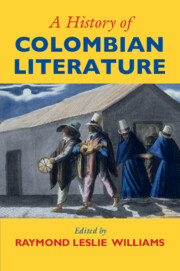Introduction
Published online by Cambridge University Press: 05 June 2016
Summary
Colombia's literature is one of its most revered national treasures, yet, paradoxically, it is generally less known outside of its national boundaries than are its internationally recognized visual artists, performance artists, soccer players, and even drug traffickers. Since the 1970s, this international ignorance with respect to Colombian literature has gradually changed, primarily because of the enormous international impact of the writing of Gabriel García Márquez. Since the meteoric rise in the international scenario of García Márquez, particularly since his Nobel Prize in Literature in 1982, today international readers have become aware of translations of writers such as Alvaro Mutis, Fernando Vallejo, Jorge Franco, and Laura Restrepo. At the same time, scholars from around the world have become increasingly regular readers of Colombian literature published in the original Spanish.
In the early sixteenth century, when the Spanish conquistador Gonzalo Jiménez de Quesada explored and conquered the region we now call Colombia, he was motivated by a fiction—the legend of El Dorado. Venturing up the Magdalena River with his soldiers, he found neither gold mines nor the fountain of eternal youth but some emeralds, a mountain full of salt, and butterflies. When he returned to Spain, he filled the ears of the Spanish Crown with more fictions and was sent back to the New World to pursue his dream. The experience of Jiménez de Quesada was but an early example of the complex, often confounding interaction between a literary and a more scientific understanding of Colombia over the centuries. Jiménez de Quesada was the quintessential man of letters, for he was the author of several tomes on a variety of political and literary topics. His Antijovio, written in approximately 1567 and published centuries later, is the earliest literary or historical text to which the contemporary reader has access.
The formative period of the new nation, from 1810 to 1862, was dominated intellectually by Julio Arboleda (1817–62) and José Eusebio Caro (1817–53). Writers of this period were typically young large landowners and aristocrats, most of whom were either actual participants or sons of those who had fought in the battles of independence. Arboleda and Caro, men of letters who thought of themselves primarily as poets, belonged to the landed gentry. Two of the most noteworthy novelists of the period were Eugenio Díaz and Juan José Nieto.
- Type
- Chapter
- Information
- A History of Colombian Literature , pp. 1 - 10Publisher: Cambridge University PressPrint publication year: 2016



